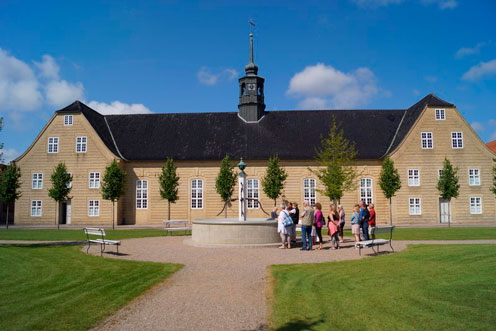Heritagization and the everyday life

What are the everyday consequences of heritagization? How do you live and engage with cultural heritage in the everyday practices? What are the tangible implications of becoming UNESCO World Heritage in the intangible dimensions of a religious community and their everyday lives, rituals, routines, and identity? How is a site memorised – how is past, present and future lived simultaniously? How, by whom and what parts of history is highlighted and cared for in the daily practices of being living heritage? How do design and crafts serve as pivotal material elements in nationalized heritage paradigms and how are they entangle with immaterial changeability?
These questions among others will be discussed during the two-day seminar. The status of Christiansfeld as UNESCO World Heritage (since 2015) makes it an interesting and timely site of study in terms of processes and consequences of heritagization, and the implications of UNESCO status in everyday life in Christiansfeld, whether or not part of the Moravian Brethren. Beside Christiansfeld also other heritage themes and sites in and outside Europe will be illuminated; Europe as a “memory-land”, design and heritage, the Jemaa el Fna marketplace in Marrakech, the life of Bedouins around Petra in Jordan, memorialising Christian heritage in Europe etc.
All are welcome!
Registration required by e-mail to kjp675@alumni.ku.dk before 15 August, 2019. Please note in mail whether you are a student or and independent or affiliated researcher.
The seminar is organized by Professor WSO Tine Damsholt & Ass. Professor Marie Riegels Melchior from the Saxo Institute, Faculty of Humanities, and sponsored by the Independent Research Fund Denmark via the research network Religion, Modernity, and Cultural Heritage: Inquiries into the Legacy and Sustainability of Moravian Christiansfeld (2018 - 2020). More information https://teol.ku.dk/english/dept/religion-modernity-and-cultural-heritage/
Programme
29 August
10:00 Registration & Coffee
10:15 Welcome
10:30 Hesitant Heirs and the Intrusiveness of Heritage & Q/A (30 min.)
Professor Anne Eriksen
12:00 Lunch
13:00 Practicing and Memorialising Christianity: the life cycle of everyday
culture & Q/A (15 min.)
Professor Peter Jan Margry
14:00 Workshop & Panel talks
- Working with sustainable tourism
Film presentation by the Christiansfeld Center - Being Living Cultural Heritage, and still being alive
Pastor, Dr. Jørgen Bøytler - "It’s just people who wrote that in a book" - Negotiation of heritage knowledge among the Moravian Brethren in Christiansfeld
Research Assistant Rasmus Rask Poulsen
15:00 Coffee & Tea
15:30 Group work
16:15 Workshop discussion
16:45 The heritagization of design culture. ‘Heritage’ as generative concept in the
managing, developing and marketing of design (45 min.) + Q/A (15 min.)
Associate Professor Niels Peter Skou
30 August
9:30 Coffee & Tea
10:00 Afterlife as Heritage & Q/A (15 min)
Professor Valdimar Tr. Hafstein
11:00 Safeguarding everyday life in the age of Universalities - Q/A (15 min.)
Associate Professor Mikkel Bille
12:00 Lunch
13:00 Concluding discussion: Round table
14:00 End of Seminar
Speakers
Anne Eriksen is professor of Cultural history and Museology at the University of Oslo. Her field of interests spans from popular religion, history of science to memorialisation, notions of history and time, and traditions and uses of the past. She is currently working on a project on cultural heritage and historical sites.
Jørgen Bøytler holds a PhD in Theology. Since 1997 Pastor of the Moravian Church Christiansfeld, from 2007-2010 Director European Continental Province of the Moravian Church, and since 2010 Unity Board Administrator. Jørgen Bøytler has been active in the process for Christianfeld being listed on UNESCO World Heritage List (2015).
Mikkel Bille holds a PhD in Social Anthropology from University College London and has published on heritage in the Middle East, material culture studies and more recently leading a project on lighting, atmosphere and urban spaces.
Niels Peter Skou is Associate Professor at Department of Design and Communication, University of Southern Denmark. He has a background in intellectual history and is Ph.D. on a dissertation on the Danish designer, architect and cultural critic Poul Henningsen and his view on design and democracy. His present research focusses on the role of history, time and nature in Design Culture including intersections between cultural heritage and experience economy.
Peter Jan Margry is professor at the University of Amsterdam and senior research fellow at the Meertens Institute, KNAW. His field of research is past and present religious cultures, rituals, materiality, conflicts and intangible heritage. He is currently working on a project on memorialisation, self and society.
Rasmus Rask Poulsen is a research assistant with the cross-European HERILIGION-project at the Department of Anthropology at the University of Copenhagen. Here he works on the heritagization of religious practice, objects and places at the three Danish World Heritage Sites of Jelling, Roskilde and Christiansfeld.
Valdimar Hafstein is professor of Folkloristics/ethnology at the University of Iceland. His field of research is cultural heritage, authorship and intellectual property and has recently published his ethnographies of the UNESCO Convention of the intangible heritage in the book Making Intangible Heritage.

